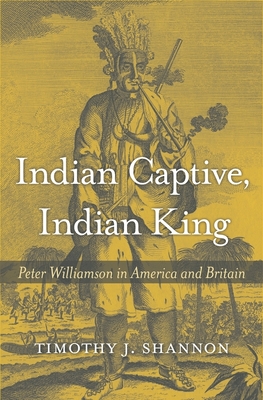

 Harvard University Press
Harvard University Press
Indian Captive, Indian King: Peter Williamson in America and Britain


Key Metrics
- Timothy J Shannon
- Harvard University Press
- Hardcover
- 9780674976320
- 9.4 X 6.4 X 1.1 inches
- 1.5 pounds
- Biography & Autobiography > Historical
- English
 Secure Transaction
Secure TransactionBook Description
In 1758 Peter Williamson appeared on the streets of Aberdeen, Scotland, dressed as a Native American and telling a remarkable tale. He claimed that as a young boy he had been kidnapped from the city and sold into slavery in America. In performances and in a printed narrative he peddled to his audiences, Williamson described his tribulations as an indentured servant, Indian captive, soldier, and prisoner of war. Aberdeen's magistrates called him a liar and banished him from the city, but Williamson defended his story.
Separating fact from fiction, Timothy J. Shannon explains what Williamson's tale says about how working people of eighteenth-century Britain, so often depicted as victims of empire, found ways to create lives and exploit opportunities within it. Exiled from Aberdeen, Williamson settled in Edinburgh, where he cultivated enduring celebrity as the self-proclaimed king of the Indians. His performances and publications capitalized on the curiosity the Seven Years' War had ignited among the public for news and information about America and its native inhabitants. As a coffeehouse proprietor and printer, he gave audiences a plebeian perspective on Britain's rise to imperial power in North America.
Indian Captive, Indian King is a history of empire from the bottom up, showing how Williamson's American odyssey illuminates the real-life experiences of everyday people on the margins of the British Empire and how those experiences, when repackaged in travel narratives and captivity tales, shaped popular perceptions about the empire's racial and cultural geography.
Author Bio
Professor Shannon teaches Early American, Native American, and British history. His most recent book is Indian Captive, Indian King: Peter Williamson in America and Britain (Harvard University Press, 2018), which was awarded the 2019 Frank Watson Book Prize for best book in Scottish History.
He is also the author of Iroquois Diplomacy on the Early American Frontier (Penguin, 2008) and Indians and Colonists at the Crossroads of Empire: The Albany Congress of 1754 (Cornell, 2000), the latter of which won the Dixon Ryan Fox Prize from the New York State Historical Association and the Distinguished Book Award from the Society of Colonial Wars.
His other books include Going to the Source: The Bedford Reader in Early American History, 5th edition (Bedford/St. Martin’s Press, 2020); Atlantic Lives: A Comparative Approach to Early America, second edition (Routledge, 2019); The Seven Years’ War in North America: A Brief History with Documents, (Bedford, 2014); and American Odysseys: A History of Colonial North America, co-authored with David Gellman (Oxford, 2014).
His work has been supported by fellowships from the National Endowment for the Humanities, the John Carter Brown Library, and the Huntington Library. His current project examines Benjamin Franklin’s relations with and writings about Native Americans.
source: Gettysburg College
Videos
No Videos
Community reviews
Write a ReviewNo Community reviews